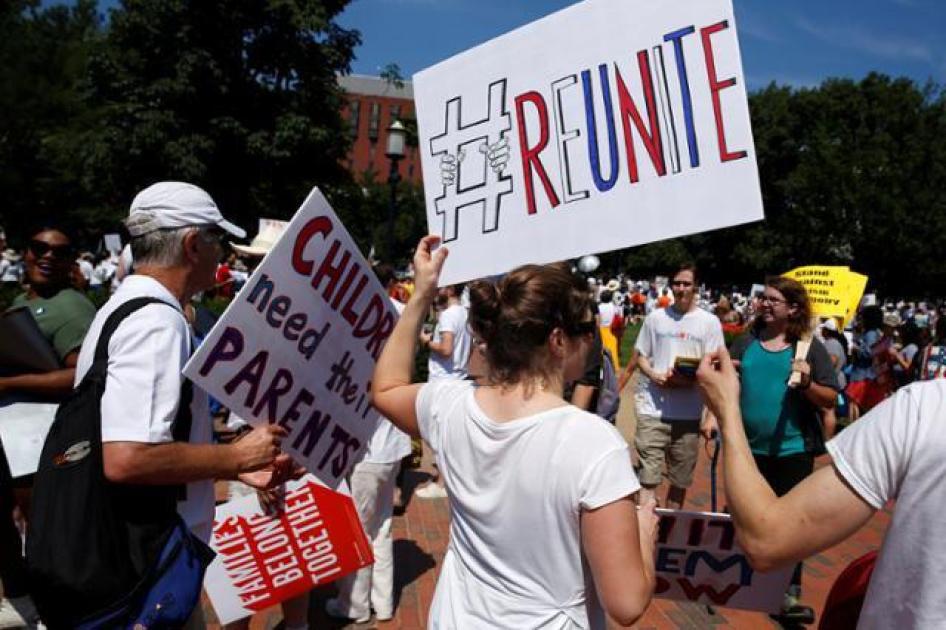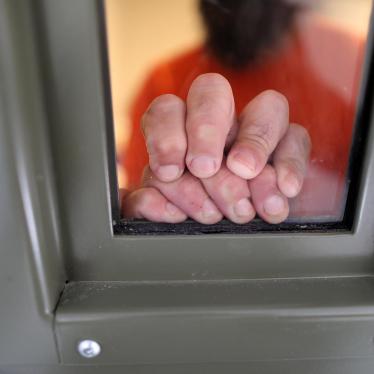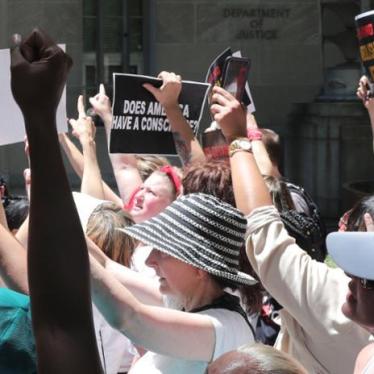I wanted to tell the woman sitting across from me that she was safe now, but it wasn't true.
This Mother's Terrifying Journey Should Be Over, But It's Not
Published in:
CNN
The day before we met, "Livia" had passed her 15-month-old daughter, "Mia," over the border fence near El Centro, California, before climbing over it herself. Once on the US side, they started walking, looking for an opportunity to turn themselves in to the Border Patrol to ask for protection. When they were arrested 20 minutes later, it felt like the final step in a terrifying journey, she told me, as I took in the deep circles under her eyes and the curly haired child on her lap.
Livia, which is a pseudonym I'm using at her request, told me she and her husband had made a living with a small corner store in Atlantida, Honduras, selling rice, beans, matches, soap, and other household sundries. Livia didn't want to leave, but "now I cannot go back," she said. When she was pregnant with Mia, the gangs — who control some areas of the country as de facto authorities — told them they would have to start paying an "impuesto de guerra" or war tax, a weekly charge backed up by death threats. Fearing eventual violence, they decided together to not put her husband "Rolando's" name on Mia's birth certificate, in an effort to protect her from the gangs. Livia and Rolando paid for over a year until finally they could no longer make the sales revenue stretch to cover the war tax.
Extortion is the emblematic crime of the "maras," or gangs, in Honduras, so much so that the International Crisis Group reports that the Honduran Chamber of Commerce no longer publishes a registry of its members. Extortionary requests are backed up by the gangs' brutal acts of violence, which include their chronic abuse of women and forced recruitment. Overall, violence in Honduras has caused the forced displacement of more than 200,000 people in the country, according to the Norwegian Refugee Council.
According to the Asylum Division of US Citizenship and Immigration Services, between October 2017 and January 2018, about 1,500 Hondurans a month requested "credible fear" interviews at the US border to determine whether they could proceed with the asylum process in immigration court. Thousands more monthly are apprehended at the border, according to US Customs and Border Protection. Given the government's finite family detention capacity and court rulings halting the inhumane practice of family separation, most families now again receive summons to pursue their asylum claims in immigration court directly and are released.
Three months ago, right around Mia' first birthday, Livia told me gang members came to the store, burned it down, and killed her husband. "I was there. They saw me and said I should run without looking back. They said if I stayed they would kill my daughter." She fled with Mia in her arms directly from the scene to her mother's house nearby. With 1,000 lempiras (about $40) from her mother in her pocket, she fled that night for Guatemala by bus, then Mexico, and finally to the United States, where she hoped to live in safety with a family friend in Colorado. "I couldn't even go to my husband's funeral," she said.
The odds that Livia will be treated fairly in her efforts to seek refuge in the United States are more stacked against her than at any time in recent history. Though the Trump administration no longer has a blanket policy of separating families at the border, it has declared its intention to subject families like Livia's to prolonged detention while they attempt to get a fair hearing on their asylum claims.
In the Border Patrol station where Livia and Mia were detained after crossing the border, she told me she couldn't eat the food offered to her because of a wheat allergy. Livia was hungry, and Mia, too. Mia squirmed with a diaper rash and seemed hot to the touch. Livia worried that Mia was dehydrated. "I'm having a hard time making enough milk, because I'm not getting enough food," she told me. "And I don't want to ask for a doctor because I'm afraid it will hurt my case."
Border Patrol agents have repeatedly run roughshod over asylum seekers' rights at the border, including through intimidation, dismissing their fear claims, and physical abuse, according to heavily redacted government documents Human Rights Watch obtained through the Freedom of Information Act.
The night that Livia and Mia were arrested, Livia said she spoke with a Border Patrol officer, telling him why she mortally feared returning to Honduras. She told me, "He said I was lying, because my daughter does not have my husband's last name." Nonetheless, she said, at the end of the interview the officer told her that she would be able to see a judge to make her asylum claim.
It's lucky that Livia avoided a common fast-track deportation procedure called expedited removal. Under that procedure, she would have had to pass what's known as a "credible fear" interview to win the right to see a judge. Until recently, the majority of noncitizens who received credible fear interviews passed them, but in July, after Attorney General Jeff Sessions' decisionin June, new guidance went into effect directing the asylum officers who conduct these interviews to drastically narrow asylum eligibility for people fleeing gang violence and domestic abuse, and to consider rejecting the claims of people if they did not enter at official ports of entry.
Many desperate people like Livia cross at other places along the border because US border authorities are now telling those who appear at border ports of entry to lodge asylum claims that they are too busy to process their claims, and make them endure long, anxious waits of days, even weeks, to enter, often in lawless northern Mexican border towns. Senior officials in the Department of Homeland Security are working on a plan to close ports of entry entirely to asylum seekers, only allowing applications for protection from abroad, The New York Times has reported.
Someone like Livia who doesn't pass a "credible fear" interview with an asylum officer could be deported within weeks. Someone who does would be in the same position Livia is now, putting their hopes in the epically back-logged immigration court system, where their chances of being granted protection will depend more on whether she can afford a lawyer to represent them, which judge ends up making the decision, and how much pressure that judge is feeling to meet what, in effect, are case completion quotas, rather than the consistent and careful application of the rule of law. Once in immigration court, nearly 80% of Hondurans are denied protection, with those unrepresented by a lawyer facing a 95% denial rate.
There are compassionate, dignified and effective alternatives to this broken and increasingly cruel system. These would include taking family separation off the table completely, not subjecting families and children to detention, ensuring access to attorneys, and investing in a fair and timely immigration adjudication system.
I wanted so badly to tell this woman, with a child almost the same age as my own, that she was safe now, that her terrifying journey was over, and that she was welcome here to make a new life, to grieve and recover.
But it just wasn't true. What I did say was this: There are many people in this country who welcome you and your child, and who are fighting so that you will be treated with dignity and compassion. People are speaking out, protesting, donating, volunteering and turning to Congress to make that a reality. That work, for people like Livia and Mia, could not be more urgent.
Your tax deductible gift can help stop human rights violations and save lives around the world.
Region / Country
Most Viewed
-
April 25, 2024
Burkina Faso: Army Massacres 223 Villagers

-
November 25, 2019
A Dirty Investment

-
April 27, 2021
A Threshold Crossed

-
June 24, 2022
Q&A: Access to Abortion is a Human Right

-
September 3, 2019
“Don’t Punish Me for Who I Am”






